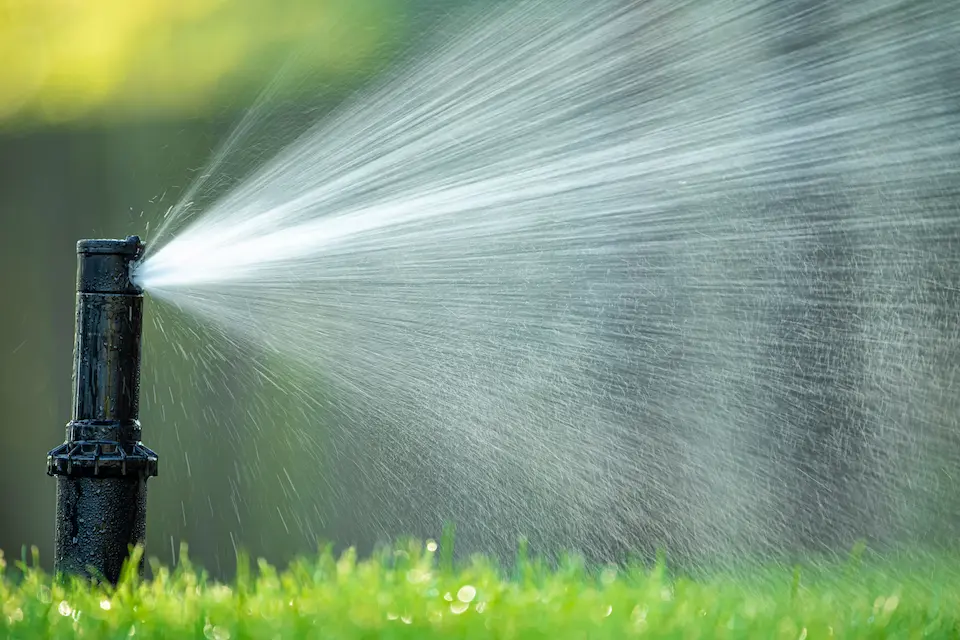An irrigation system is a vital component of maintaining a lush and healthy lawn, especially in regions where natural rainfall isn’t sufficient to sustain plant growth. Understanding the various types of irrigation systems available is crucial for North Carolina homeowners seeking to optimize their lawn care efforts. From manual watering methods to sophisticated automated systems, the choices can seem overwhelming.

At FortSmith Landscaping, our Wake Forest lawn care experts are sharing information on what an irrigation system is, why it’s essential for your lawn’s health, and the different types of complex irrigation systems available.
What is an Irrigation System?
An irrigation system is a method or piece of infrastructure designed to deliver water to crops or landscapes in a controlled and efficient manner. Its primary purpose is to supplement rainfall and provide adequate moisture for plant growth, especially in regions where natural precipitation is insufficient or unreliable.
When it comes to watering your lawn, there are several types of irrigation systems to consider. Each system has its own advantages and disadvantages, as well as suitability for different lawn types and landscapes.
Manual Irrigation
Manual irrigation involves using hoses, watering cans, or other handheld tools to water the lawn. While this method offers flexibility and control over where water is applied, it can be time-consuming and labor-intensive, especially for larger lawns. Manual irrigation is best suited for small yards, gardens, or areas with specific watering needs.
Pros:
- Flexibility to water-specific areas as needed.
- No installation or maintenance costs.
Cons:
- Time-consuming and labor-intensive.
- Inconsistent watering may lead to over or under-watering.
Sprinkler Systems
Sprinkler systems are one of the most popular choices for residential irrigation. These systems use a network of underground pipes connected to sprinkler heads that distribute water evenly across the lawn. Sprinkler systems can be customized to accommodate different lawn sizes and shapes, and they can be programmed to water at specific times. Sprinkler irrigation systems are ideal for medium to large-sized lawns with uniform watering needs.
Pros:
- Even distribution of water across the lawn.
- Can be automated for convenience.
- Suitable for a wide range of lawn sizes and shapes.
Cons:
- Initial installation costs can be high.
- May require regular maintenance to prevent clogging or damage.
Drip Irrigation
Drip irrigation is a water-efficient method that delivers water directly to the base of plants through a network of tubes or pipes with emitters. This targeted irrigation technology approach minimizes water waste by reducing evaporation and runoff. Drip irrigation is ideal for conserving water and maintaining soil moisture levels, making it a popular choice for gardens, flower beds, shrubbery, and areas with water-sensitive plants.
Pros:
- Water-efficient and minimizes waste.
- Prevents weed growth and soil erosion.
- Suitable for slopes and uneven terrain.
Cons:
- The initial installation cost may be higher than other systems.
- Requires periodic maintenance to check for clogs and leaks.
Soaker Hoses
Soaker hoses are porous hoses that release water slowly along their length, effectively delivering moisture directly to the soil. These irrigation water hoses are typically laid on the ground or buried slightly below the surface and are ideal for watering narrow or irregularly shaped areas. Soaker hoses are an affordable and efficient option for homeowners looking to conserve water while keeping their lawns hydrated.
Pros:
- Water-efficient and reduces evaporation.
- Easy to install and relatively inexpensive.
- Suitable for narrow or irregularly shaped areas.
Cons:
- Limited coverage compared to other systems.
- May require frequent monitoring to ensure even watering.
Factors to Consider When Choosing a Lawn Irrigation System
Selecting the right surface irrigation methods for your lawn involves careful consideration of various factors to ensure optimal watering efficiency and healthy plant growth. Here are some key factors to keep in mind when making your decision on your lawn’s irrigation system.
Lawn Size and Shape
The size and shape of your lawn play a significant role in determining the most suitable watering systems. Larger lawns may require a system with greater surface water coverage, such as sprinklers or drip irrigation. In contrast, smaller yards or irregularly shaped areas may be adequately served by manual watering methods or soaker hose systems.
Soil Type and Drainage
Understanding your soil type and drainage characteristics is essential for efficient water distribution and absorption. Sandy soils drain quickly and may require more frequent watering, while clay soils retain moisture for longer periods. Tailor your irrigation system to accommodate your soil’s drainage properties to prevent over or under-watering.
Climate and Weather Patterns
Consider the climate and weather patterns in your region when selecting an irrigation system. Areas with hot, dry climates may benefit from systems that provide more frequent watering or have adjustable settings to accommodate changing weather conditions. Conversely, regions with cooler, wetter climates may require less frequent watering or systems with built-in rain sensors to prevent over-watering.
Water Source Availability and Pressure
Assess the availability and pressure of your water source to determine the feasibility of different irrigation systems. Sprinkler systems and drip irrigation typically require adequate water pressure to ensure proper operation and coverage. Additionally, consider factors such as water conservation regulations and restrictions that may impact your choice of irrigation system.
Maintenance Requirements
Evaluate the maintenance requirements associated with each irrigation system to ensure ongoing performance and longevity. Some systems, such as manual watering methods or soaker hoses, may have minimal maintenance needs, while others, like sprinkler head systems, may require regular inspections, adjustments, and repairs to keep them functioning optimally.
Budget Considerations
Determine your budget for irrigation system installation, operation, and maintenance before making a decision. While certain systems may have higher upfront costs, they may offer long-term savings through water conservation and reduced maintenance expenses. Compare the initial investment, ongoing operational costs, and potential water savings to choose the most cost-effective option for your lawn.
Selecting the Right Irrigation System for Your Lawn
Choosing the appropriate irrigation system for your lawn is crucial for maintaining its health and vitality while conserving water and minimizing maintenance efforts. Here’s a step-by-step guide to help you select the right irrigation system for your Wake Forest lawn.
Assess Your Lawn’s Needs
Begin by assessing your lawn’s specific watering requirements, including its size, shape, soil type, and plant species. Consider factors such as sun exposure, shade, and any slopes or uneven terrain that may affect water distribution. Understanding your lawn’s needs will help you narrow down your options and prioritize key features in an irrigation system.
Understand Your Preferences and Lifestyle
Take into account your personal preferences and lifestyle when choosing an irrigation system. Consider factors such as your availability to manually water the lawn, your desire for automated watering schedules, and your commitment to ongoing maintenance. Determine whether you prefer a hands-on approach or a more hands-free, automated system that requires minimal intervention.
Evaluate Cost-Effectiveness and Efficiency
Compare the cost-effectiveness and efficiency of different irrigation systems to determine the best value for your lawn. Consider factors such as initial installation costs, ongoing operational expenses, water conservation benefits, and potential long-term savings. While some irrigation systems may have higher upfront costs, they may offer greater efficiency, water savings, and reduced maintenance requirements over time.
Consider Environmental Factors
Take into account environmental factors such as local climate conditions, water availability, and conservation regulations when selecting an irrigation system. Choose an irrigation system that is well-suited to your region’s climate and weather patterns, and consider options that promote water conservation and minimize environmental impact.
Evaluate Compatibility with Existing Infrastructure
Assess the compatibility of potential irrigation systems with your lawn’s existing infrastructure, including water sources, piping, and landscaping features. Ensure that the chosen irrigation system integrates seamlessly with your lawn’s layout and design, and consider any modifications or upgrades that may be required for installation.
Consult with Professionals
If you’re unsure about which irrigation system is best suited for your lawn, consider consulting with Wake Forest landscaping professionals. The team at FortSmith Landscaping can assess your lawn’s unique characteristics, recommend suitable irrigation options, and provide expert guidance on installation, maintenance, and optimization. Our expertise can help you make an informed decision that aligns with your lawn care goals and budget.
Contact Our Wake Forest Irrigation Systems Experts Today
Ready to transform your lawn with the perfect irrigation system? Contact our Wake Forest irrigation system experts at FortSmith Landscaping today. Whether you need help selecting the right irrigation system, installing it, or maintaining your lawn’s overall health, our team is here to help.
Don’t wait any longer to achieve the lush, vibrant lawn you’ve always wanted. Reach out to us to schedule a consultation and take the first step towards a greener, healthier outdoor space.
Get started by calling us at (919) 228-8495 or filling out the contact form below.
